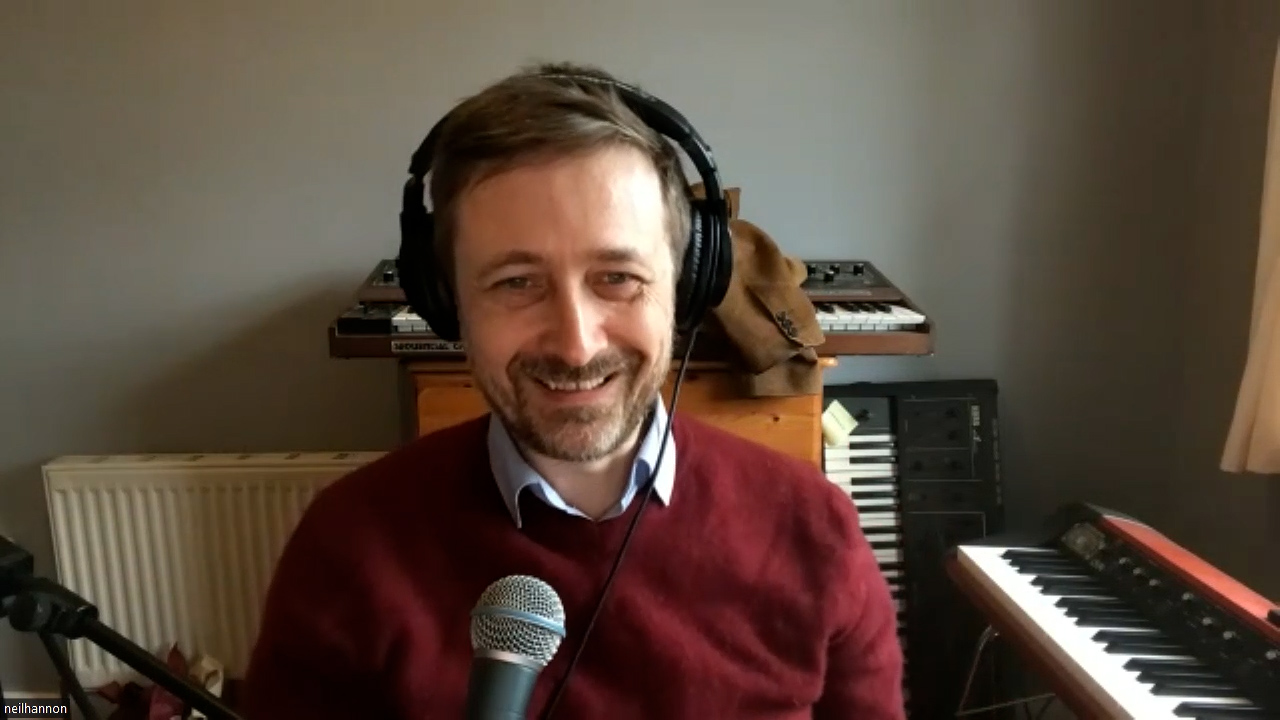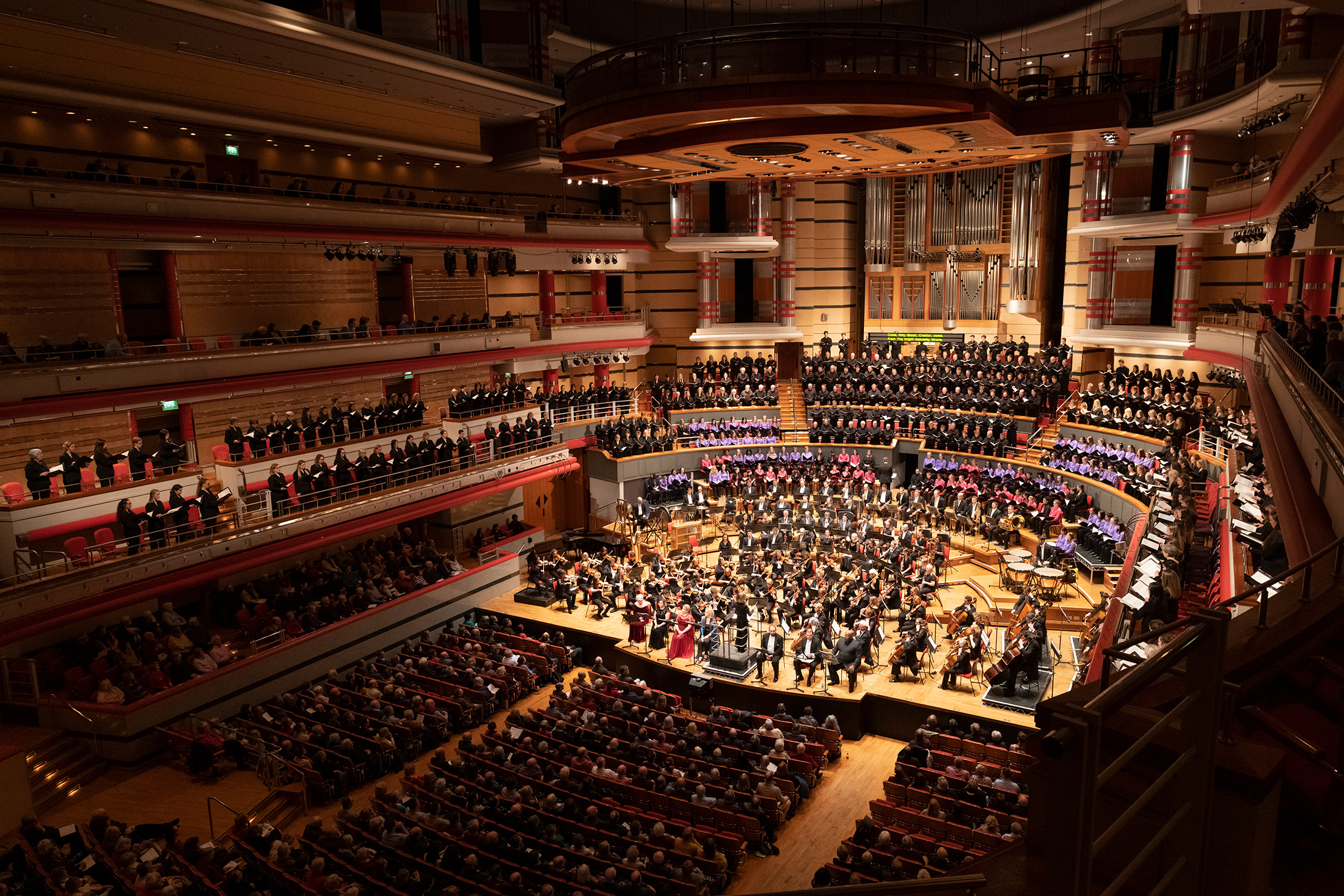Neil Hannon’s new work ‘As The Sun Brightens, the Shadows Deepen’ is premiered by the Ulster Orchestra on Friday 5 May 2023. Tickets available via the Ulster Orchestra website.
Late summer 1996. I’m 25, sailing with a university friend, Southampton to the Channel Islands and back. My first time sailing. Accompanying us on our epic 5-day trip is my hastily purchased copy of Competent Crew, and a soundtrack provided by Radio 1 which appears to favour both Female of the Species and The Divine Comedy’s Something for the Weekend on heavy rotation.
This unlikely trip (I don’t like the sea – I’m, at best, a histrionic swimmer) is a much-needed antidote to what was turning out to be a consistently stressful job. As an orchestral fixer, it was my job to find musicians able enough to play demanding programmes and willing enough to do it unpaid. With no meaningful budget other than expenses, booking musicians for concerts was often a thankless task.
Whilst some of the brass players were repeatedly asking for days ‘off’ for trials with the CBSO, Philharmonic and the rest, in 1996 there was an additional pressure – a recurring gig elsewhere in the UK that was paying money and nabbing all of my contacts, bleeding my database dry.
“Sorry,” was the familiar reply, “I’m doing Divine Comedy that weekend.” Bastards. It took me months to work out how and why orchestral musicians would be required to work or indeed want to work with a pop band.
It’s only now, 25 years later, I understand why they were drawn to say yes. It was more than just money. It was creative leadership. Someone who delivered what he promised. Take a listen to the dazzlingly rich concept album ‘Fin de Siecle’ from The Divine Comedy released in ’98 and you’ll hear the results. Reading the personnel list of the Brunel Ensemble who played on the album brings the memories flooding back. I had forgotten just how many gaps that resulted in the orchestral I was fixing for.
I drop this anecdote into the conversation when me and composer, writer and singer Neil Hannon meet for an interview. He laughs mischievously perhaps apologetically. His self-effacing manner – he describes his early output in a blog post in 2014 as mere ‘foolish pop songs’ – is endearing. It is a hint of what I remember a new generation of musicians saying about The Divine Comedy back in 1997. Hannon’s magnetic charm makes his creative output all the more enthralling. A master of highly descriptive lyrics, a compelling storyteller, and an epic aural imagination. As I listen to ‘Fin de Siecle’ in preparation for the interview there’s a hint of an oratorio too – a narrative through-line.

Twenty-five years later Hannon has a new orchestral piece about Derry-Londonderry in 1963. In joining forces with the Ulster Orchestra again (the previous occasion was in 2014) Hannon is contributing to an artistic legacy in the process. It’s a creative collaboration that also reinforces the Ulster Orchestra’s ongoing reputation as an organisation that has transformed and reasserted itself financially and artistically, reasserting itself as a vital contributor to cultural life in Northern Ireland. The commission continues the orchestra’s ongoing commitment to unconventional collaborations with artists from across the island, seen in their polished Salon Session series with Jordan Atejundi, Dani Larkin and Niamh Dunne.
Hannon’s work – As The Sun Brightens, The Shadows Deepen – draws on a short film made in 1963 documenting life in Derry-Londonderry, combining excerpts from the film with music for orchestra and choir written by him. The film is narrated by his father, who passed away last year after suffering from Alzheimers. A deeply personal piece then? Not initially it seems.
“Originally I was asked to do something for the Ulster Orchestra by their artistic director Patrick McCarthy,” explains Hannon. “He came backstage at a gig we were doing in Belfast. I was moaning that I never get to write and that I thought I would like to write more for orchestra. They got back to us a few months later to commission me on the one proviso that it would be something loosely about Northern Ireland.
“No ideas came to me at first but after my dad passed away a funeral conversation pointed me in the direction of a film that he had something to do with about John Hume from the SDLP – a sort of legend. A few days later a resourceful young niece found the film on the internet. And when I saw it, I was just like, that’s amazing. That’s brilliant. That’s everything I love.”
The film by Terence McDonald and John Hume called ‘A City Solitary’ is based on Hume’s research for his thesis on Derry~Londonderry, charts the development of the city.
For people of a certain age, the style is both nostalgic and startling. Seven years before Neil Hannon’s birth, the black and white footage combined with the stately editing is from a bygone era of documentary filmmaking. Depicting a stark disparity in the quality of living for the then-Londonderry population, the film also highlights the impact that emigration and immigration had on the city.
Underneath shots of fishing boats and empty run-down houses, Neil Hannon’s father, the late Bishop Brian Hannon, who was then a curate in the city narrates. The new work’s title is derived from one of the most thought-provoking moments – ‘As the sun shines brightly, the shadows deepen.’ “He was only 26 or 27 when he recorded that. He has the right tone for the job,” reflects Hannon, “almost cut glass with an Irish lilt. That is the voice I remembered as a very small boy.”

Even on a Zoom call, Hannon is a gentle presence. Generosity and thoughtfulness nestle comfortably together with a charming modesty that invites admirers to project all manner of hopes and dreams onto him.
I think I discern those same positive attributes that mark the creative out in his field. Fearless succinct lyrics dominate – Generation Sex on ‘Fin de Siecle’ in particular is a scathing statement on our obsessions at the end of the 20th century. Hannon is also a master of evocative descriptions and captivating and playful storytelling – Eric the Gardener from the same album is a highly satisfying ultra-short story. Similarly the lyrics to ‘Songs of Love’ on the preceding album ‘Casanova’. Hannon loves the sound of words and knows how to use them. Then there’s that boyish curiosity for all manner of musical styles that cross multiple genres – John Adams, Steve Reich, Elgar and Vaughan Williams, in addition to his electro-synth pop origins. In Fin de Siecle it is as though he and his arranger Joby Talbot have set on meeting the challenge of combining all these varying styles into something that celebrates, entertains and means something. Little wonder it’s as fresh to listen to now as it was 25 years ago.
To set such expectations of a creative by celebrating something from their past is almost certainly not the way to preview someone’s newest work. But it does go some way to explain why his clearly well-crafted work generates the love, admiration and respect it does amongst his audience. In real life he appears to resist bombast or hyperbole makes him a stylish and sophisticated low-ley communicator. That only makes the promise of new material all the more appealing. This kind of magnetism is a potent kind of pre-publicity.
Did he go via the conservatoire route as a teenager, I ask him – I can’t find any biographical detail about his formative years. It seems formal training didn’t feature.
“I was never very good at theory. But, you know, as my very first piano teacher told me, ‘You have a very good ear’. I kind of pick things up quite easily. I can listen to a piece of music and I can tell what’s going on. I’ve gotten a lot better at this. I’ve done orchestral works, obviously for The Divine Comedy for my own songs, and sometimes I did the arrangements. I think I’ve just got better as time has gone on. And since I did that piece for the Royal Festival Hall [To Our Fathers in Distress], I think I’ve progressed much more.”
To Our Fathers In Distress also features in the Ulster Orchestra programme next week. It’s similarly oratorio-like in style with chorus, organ and orchestra joining forces to evoke domestic life in the Hannon household. The words are textbook Hannon warmth of the kind you’ll find in ‘National Express’. It’s like getting a glimpse at someone else’s family and thinking ‘I wish mine was more like his.’ Such honest imagery challenges the assumption of those of us in the East of England who learned about Northern Ireland via nightly news bulletins.
Reflecting on ‘Fin de Siecle’ and his evident love of the orchestral sound on the album, Hannon reveals the other consistent quality in his work – the art of collaboration. “I’ve always had very useful friends. In the 1990s there was Joby Talbot. He was in The Divine Comedy at the time – he’s a major composer now, writing ballets, operas and a lot of movies. He kind of would take my humble arrangements and augment them. Joby’s equivalent today is Andrew Skeet.” The band member, composer and arranger’s consummate skill is most satisfyingly evident in the LPO’s Video Games Album from 2016, in particular, the final track from Super Mario Galaxy (be sure to listen out for tight octave leaps in the horns).

“I readily admit,” continues Hannon, “I do not have the skill to sit down and write a score in full. I write every line with all the indications for instrumentation. I give the whole thing to Andrew to create the score.” Hardly a shocking admission – so many artists have adopted the same approach. Hockney springs to mind, so too Anna Meredith. Useful friends maybe if you’re being self-deprecating, more a creative producer people want to work with.
Where does the love of the orchestral sound come from, I ask. Does he remember?
“Orchestral music has been a constant in my life since the time when I wasn’t able to understand what I was listening to. My interest in, for want of a better term classical music, has gone hand in hand with my interest in pop, and jazz. As I grew up, and I never liked trying to sort of compartmentalize them.”
Hannon continues. “As much as I wanted to be a pop star, and I enjoyed it greatly, I also just wanted to make the music that I heard in my head. The funny thing is, if I hadn’t done it, when I was that age, it would never have happened. It’s only as you get older, that you realize how lucky we are to get these opportunities.”
Neil Hannon’s new work ‘As The Sun Brightens, the Shadows Deepen’ is premiered by the Ulster Orchestra on Friday 5 May 2023. Tickets available via the Ulster Orchestra website.



